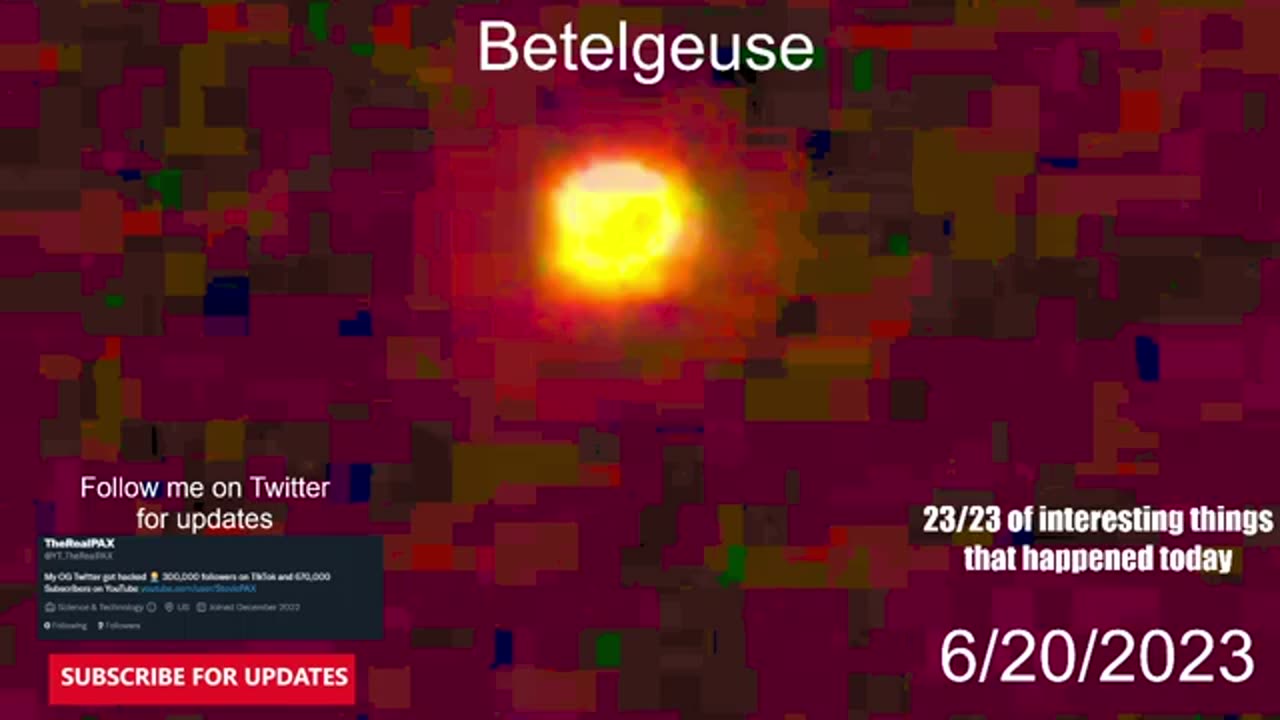Premium Only Content

Betelgeuse Supernova BREAKING NEWS! (The supernova has begun!) 6/20/2023
Breaking news from Betelgeuse! Betelgeuse in Orion could go supernova at any time. The system is predicted in 2023 producing a luminous red nova for the first time in 10,000 years!
Betelgeuse is a red supergiant star located in the constellation Orion, known for its size and brightness. It is one of the largest known stars in the galaxy and is approximately 640 light-years away from Earth. Betelgeuse is also known as Alpha Orionis, as it is the brightest star in the Orion constellation and the second-brightest star in the night sky. Betelgeuse is classified as a M-type star, meaning it has a relatively low surface temperature compared to other stars. Its diameter is estimated to be about 1,000 times larger than the Sun, and it has a mass about 20 times greater than the Sun. The star is also known for its irregular variability in brightness, which can fluctuate over periods of several years. In recent years, Betelgeuse has been a topic of interest among astronomers due to its apparent dimming in late 2019 and early 2020, leading to speculation that it might be nearing the end of its life and could potentially explode as a supernova. However, subsequent observations have shown that the star is likely in a period of normal variability and that any supernova event is not expected to occur for several thousand years. Overall, Betelgeuse is a fascinating and important object in astronomy, with its immense size, irregular variability, and potential to one day explode in a spectacular supernova. While SpaceX and Betelgeuse may seem unrelated at first glance, both represent the cutting edge of human exploration and innovation. SpaceX is pushing the boundaries of what is possible in space travel, with the goal of making it more accessible and sustainable. Meanwhile, Betelgeuse represents a tantalizing mystery of the universe, offering scientists the opportunity to study the life cycles of stars and better understand the fundamental workings of the cosmos.
-
 1:15:26
1:15:26
Tucker Carlson
2 hours agoWhistleblower Exposes the Real Puppet Masters Controlling the State Department and Plans for Gaza
12.1K15 -
 LIVE
LIVE
StoneMountain64
1 hour agoHelldivers 2 just KEEPS GETTING BETTER
91 watching -
 2:10:10
2:10:10
The Culture War with Tim Pool
3 hours agoNational Guard Sent To Chicago - Fascism Or Salvation Debate | The Culture War with Tim Pool
125K141 -

Side Scrollers Podcast
2 hours agoStreamer KICKED OUT of Renaissance Fair for Misgendering + Spiderman MELTDOWN | Side Scrollers Live
8.41K -
 LIVE
LIVE
Viss
1 hour ago🔴LIVE - Learn How To Dominate The Solo Battleground - PUBG
84 watching -
 LIVE
LIVE
Sean Unpaved
2 hours agoFumbles, Flubs, & Loogies: NFL Opener Chaos
109 watching -

The Shannon Joy Show
2 hours ago🔥🔥Friday Freestyle! - MAGA Erupts Over Trump-Gates Bromance🔥🔥
4605 -
 1:39:38
1:39:38
Steven Crowder
5 hours agoIndia First! MAGA Influencers Caught Pushing Insanely Stupid Propaganda
188K173 -
 LIVE
LIVE
IrishBreakdown
2 hours agoNotre Dame Football Mailbag
20 watching -
 DVR
DVR
The Drew Allen Show on DailyClout
3 hours ago"Trump DOJ Turns Democrats Into Gun Lovers"
3.07K